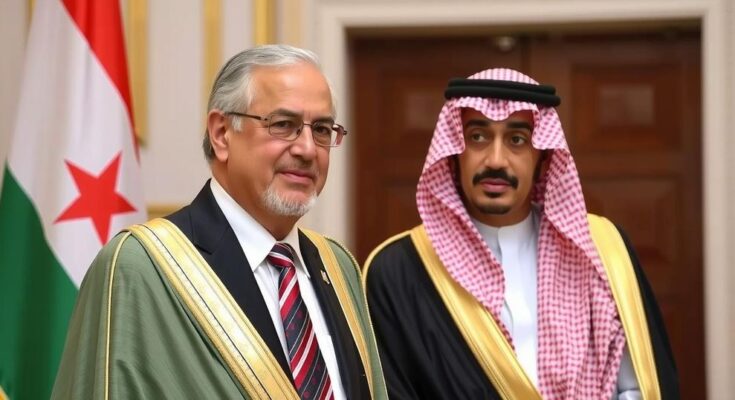Syria’s Foreign Minister, Assaad al-Shibani, embarked on a historic visit to Saudi Arabia, aiming to improve bilateral relations. He emphasized the importance of this encounter as a new beginning for cooperation, acknowledging the harsh realities faced by Syria due to ongoing civil strife. This visit occurs within a broader context of Saudi Arabia’s shifting approach towards the Assad regime and implications for future regional stability.
The Syrian Foreign Minister, Assaad al-Shibani, expressed optimism regarding the future of Syrian-Saudi relations during his inaugural foreign visit to Saudi Arabia. Arriving in Riyadh with high-ranking officials, including the Minister of Defence and the Head of General Intelligence, al-Shibani highlighted the significance of this visit, stating it as a fresh beginning between the two countries. The delegation was received warmly by Saudi authorities, indicating a possible thaw in relations after years of estrangement following the civil unrest in Syria.
The backdrop of this diplomatic engagement encompasses over a decade of turmoil in Syria, characterized by a fierce civil war that has resulted in extensive economic degradation. Saudi Arabia had previously severed ties with the Assad regime in response to its oppressive tactics against dissent during the early stages of the conflict. However, following a shift in diplomatic strategy, Riyadh has re-engaged with the Syrian government, culminating in Syrian participation in the Arab League once more. This has raised questions about Saudi Arabia’s role in shaping Syria’s post-war reconstruction and investment opportunities in the region.
Amidst the complexities of this geopolitical shift is the growing illicit trade in captagon, an amphetamine prevalent in the Syrian market, which has substantial demand in Saudi Arabia and the surrounding Gulf states, further complicating the dynamics of their renewed relations.
The diplomatic landscape between Syria and Saudi Arabia has experienced significant fluctuations over the past decade. Initially, Saudi Arabia supported opposition groups against President Bashar al-Assad’s regime, leading to a severance of diplomatic ties in 2012. The civil war in Syria resulted in extensive destruction and humanitarian crises. However, with a change in strategic perspectives in recent years, Saudi Arabia has sought to restore relations and reintegrate Syria into regional frameworks, notably through its return to the Arab League, indicating a potential pivot in foreign policy and collaborative opportunities within the region.
The visit of Syria’s Foreign Minister to Saudi Arabia signals a pivotal moment in the relationship between the two nations, potentially initiating a period of diplomatic and economic engagement. The historical context of their interactions underscores the complexities involved in fostering stability in Syria post-civil war. Saudi Arabia’s role may prove crucial not only in re-establishing ties with Syria but also in addressing associated challenges such as illicit drug trade and regional security.
Original Source: www.france24.com




